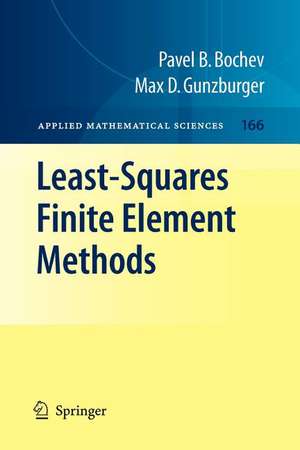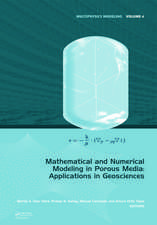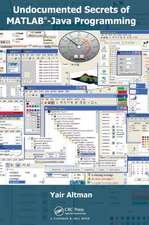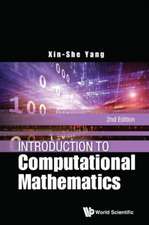Least-Squares Finite Element Methods: Applied Mathematical Sciences, cartea 166
Autor Pavel B. Bochev, Max D. Gunzburgeren Limba Engleză Paperback – 20 oct 2011
| Toate formatele și edițiile | Preț | Express |
|---|---|---|
| Paperback (1) | 799.44 lei 6-8 săpt. | |
| Springer – 20 oct 2011 | 799.44 lei 6-8 săpt. | |
| Hardback (1) | 805.77 lei 6-8 săpt. | |
| Springer – 23 mar 2009 | 805.77 lei 6-8 săpt. |
Din seria Applied Mathematical Sciences
- 13%
 Preț: 426.94 lei
Preț: 426.94 lei - 13%
 Preț: 426.46 lei
Preț: 426.46 lei - 13%
 Preț: 427.63 lei
Preț: 427.63 lei - 9%
 Preț: 1728.59 lei
Preț: 1728.59 lei - 24%
 Preț: 906.80 lei
Preț: 906.80 lei - 23%
 Preț: 659.07 lei
Preț: 659.07 lei -
 Preț: 375.65 lei
Preț: 375.65 lei - 18%
 Preț: 909.47 lei
Preț: 909.47 lei - 18%
 Preț: 795.02 lei
Preț: 795.02 lei - 18%
 Preț: 950.52 lei
Preț: 950.52 lei - 15%
 Preț: 645.47 lei
Preț: 645.47 lei - 20%
 Preț: 755.49 lei
Preț: 755.49 lei -
 Preț: 382.67 lei
Preț: 382.67 lei - 24%
 Preț: 808.06 lei
Preț: 808.06 lei -
 Preț: 452.62 lei
Preț: 452.62 lei -
 Preț: 190.23 lei
Preț: 190.23 lei -
 Preț: 399.12 lei
Preț: 399.12 lei - 18%
 Preț: 966.90 lei
Preț: 966.90 lei - 15%
 Preț: 643.48 lei
Preț: 643.48 lei - 15%
 Preț: 528.80 lei
Preț: 528.80 lei -
 Preț: 413.15 lei
Preț: 413.15 lei -
 Preț: 390.25 lei
Preț: 390.25 lei - 18%
 Preț: 736.01 lei
Preț: 736.01 lei - 18%
 Preț: 1411.05 lei
Preț: 1411.05 lei - 15%
 Preț: 711.21 lei
Preț: 711.21 lei -
 Preț: 395.47 lei
Preț: 395.47 lei - 18%
 Preț: 1017.26 lei
Preț: 1017.26 lei -
 Preț: 403.15 lei
Preț: 403.15 lei - 18%
 Preț: 1130.14 lei
Preț: 1130.14 lei - 18%
 Preț: 1134.87 lei
Preț: 1134.87 lei - 18%
 Preț: 1329.00 lei
Preț: 1329.00 lei - 18%
 Preț: 1129.65 lei
Preț: 1129.65 lei - 18%
 Preț: 1140.71 lei
Preț: 1140.71 lei
Preț: 799.44 lei
Preț vechi: 974.93 lei
-18% Nou
Puncte Express: 1199
Preț estimativ în valută:
152.98€ • 163.58$ • 127.55£
152.98€ • 163.58$ • 127.55£
Carte tipărită la comandă
Livrare economică 18 aprilie-02 mai
Preluare comenzi: 021 569.72.76
Specificații
ISBN-13: 9781441921604
ISBN-10: 1441921605
Pagini: 684
Ilustrații: XXII, 660 p.
Dimensiuni: 155 x 235 x 36 mm
Greutate: 0.94 kg
Ediția:2009
Editura: Springer
Colecția Springer
Seria Applied Mathematical Sciences
Locul publicării:New York, NY, United States
ISBN-10: 1441921605
Pagini: 684
Ilustrații: XXII, 660 p.
Dimensiuni: 155 x 235 x 36 mm
Greutate: 0.94 kg
Ediția:2009
Editura: Springer
Colecția Springer
Seria Applied Mathematical Sciences
Locul publicării:New York, NY, United States
Public țintă
ResearchCuprins
Survey of Variational Principles and Associated Finite Element Methods..- Classical Variational Methods.- Alternative Variational Formulations.- Abstract Theory of Least-Squares Finite Element Methods.- Mathematical Foundations of Least-Squares Finite Element Methods.- The Agmon#x2013;Douglis#x2013;Nirenberg Setting for Least-Squares Finite Element Methods.- Least-Squares Finite Element Methods for Elliptic Problems.- Scalar Elliptic Equations.- Vector Elliptic Equations.- The Stokes Equations.- Least-Squares Finite Element Methods for Other Settings.- The Navier#x2013;Stokes Equations.- Parabolic Partial Differential Equations.- Hyperbolic Partial Differential Equations.- Control and Optimization Problems.- Variations on Least-Squares Finite Element Methods.- Supplementary Material.- Analysis Tools.- Compatible Finite Element Spaces.- Linear Operator Equations in Hilbert Spaces.- The Agmon#x2013;Douglis#x2013;Nirenberg Theory and Verifying its Assumptions.
Recenzii
From the reviews:“In the book under review, the authors give a unified and comprehensive treatment of least-squares finite element methods and discuss important implementation issues that are critical to their success in practice. … This book is valuable both for researchers and practitioners working in least-squares finite element methods. … In addition, others will find it a great reference for learning about the theory and implementation of the least-squares finite element methods.” (Tsu-Fen Chen, Mathematical Reviews, Issue 2010 b)
Textul de pe ultima copertă
The book examines theoretical and computational aspects of least-squares finite element methods(LSFEMs) for partial differential equations (PDEs) arising in key science and engineering applications. It is intended for mathematicians, scientists, and engineers interested in either or both the theory and practice associated with the numerical solution of PDEs.
The first part looks at strengths and weaknesses of classical variational principles, reviews alternative variational formulations, and offers a glimpse at the main concepts that enter into the formulation of LSFEMs. Subsequent parts introduce mathematical frameworks for LSFEMs and their analysis, apply the frameworks to concrete PDEs, and discuss computational properties of resulting LSFEMs. Also included are recent advances such as compatible LSFEMs, negative-norm LSFEMs, and LSFEMs for optimal control and design problems. Numerical examples illustrate key aspects of the theory ranging from the importance of norm-equivalence to connections between compatible LSFEMs and classical-Galerkin and mixed-Galerkin methods.
Pavel Bochev is a Distinguished Member of the Technical Staff at Sandia National Laboratories with research interests in compatible discretizations for PDEs, multiphysics problems, and scientific computing.
Max Gunzburger is Frances Eppes Professor of Scientific Computing and Mathematics at Florida State University and recipient of the W.T. and Idelia Reid Prize in Mathematics from the Society for Industrial and Applied Mathematics.
The first part looks at strengths and weaknesses of classical variational principles, reviews alternative variational formulations, and offers a glimpse at the main concepts that enter into the formulation of LSFEMs. Subsequent parts introduce mathematical frameworks for LSFEMs and their analysis, apply the frameworks to concrete PDEs, and discuss computational properties of resulting LSFEMs. Also included are recent advances such as compatible LSFEMs, negative-norm LSFEMs, and LSFEMs for optimal control and design problems. Numerical examples illustrate key aspects of the theory ranging from the importance of norm-equivalence to connections between compatible LSFEMs and classical-Galerkin and mixed-Galerkin methods.
Pavel Bochev is a Distinguished Member of the Technical Staff at Sandia National Laboratories with research interests in compatible discretizations for PDEs, multiphysics problems, and scientific computing.
Max Gunzburger is Frances Eppes Professor of Scientific Computing and Mathematics at Florida State University and recipient of the W.T. and Idelia Reid Prize in Mathematics from the Society for Industrial and Applied Mathematics.
Caracteristici
Puts least-squares finite element methods on a common mathematically sound foundation Reviews strengths and weaknesses, successes and open problems of finite element methods Appendices include results from functional analysis and standard finite theory Includes supplementary material: sn.pub/extras





















